An Unknown Poet Who Deserves To Be Known

In 1943, a refugee German Jewish poet wrote “A Black Woman on the Harlem Express” which apostrophizes an African-American passenger sitting opposite her on the Manhattan subway: “Do you know that we are secretly sisters?/ You, dark brown daughter of the Congo,/ and I, the pale European Jewish child.” Alluding to a shared identity as targets of hatred, whether racism or anti-Semitism, Mascha Kaléko’s wry, ballad-like stanzas, much influenced by Heinrich Heine, have grown in popularity among German readers since her death in 1975. Recently, Deutscher Taschenbuch Verlag (DTV) has published in paperback an appealing biography of the poet by Jutta Rosenkranz.
Kaléko’s hectic life began in 1907 in Chrzanów, Poland, born Golda Malka Aufen to a family which fled pogroms to Germany at the start of World War I. She grew up in an East European Jewish slum in Berlin, and in 1928 she married Saul Aron Kaléko, a Hebrew philologist. Her second husband was Chemjo Vinaver (1900–1973), a musicologist and conductor specializing in Hasidic choral works. During the late 1920s and early 1930s she briefly flourished as a public poet alongside such other German Jewish talents as satirist Kurt Tucholsky and Else Lasker-Schüler. Kaléko’s colloquial, pointedly witty verse, some in Berlin dialect, won praise for its authenticity from such discerning readers as Thomas Mann and the Austrian Jewish wit Alfred Polgar (born Alfred Polak).
In 1938 she fled Germany for New York, and although she returned for brief visits after the war, Kaléko’s poems subtly underline what had changed. Her 1956 poem “Germany: a Fairy Tale” (the title alludes directly to Heine’s satirical “Germany: A Winter’s Tale” and its recurrent themes of the agony of exile and longing for a lost land). “Germany: a Fairy Tale” observes that by the late 1950s, Heine’s posthumous fate had improved. During the Nazi era, his memory had been effaced in publications which were obliged to reprint his poems since they had become an essential part of German language and culture, but instead of attributing them to a Jew, the Nazi-approved publishing houses ascribed them to anonymous folklore. Responding to this notorious attempt to destroy all memory of her favorite author, Kaléko ironically notes that during the 1950s in Germany, Heine’s “name is slowly getting familiar./ In books, ‘Heinrich Heine’ is cited/ and not ‘Unknown Author.’” English-language readers deserve a book-length translation of Kaléko’s appealing verse, which would make her less of an unknown author.
Listen to Mascha Kaléko read her own poems here.
See a fan reading an excerpt from Kaléko’s poetry here.
The Forward is free to read, but it isn’t free to produce

I hope you appreciated this article. Before you go, I’d like to ask you to please support the Forward.
Now more than ever, American Jews need independent news they can trust, with reporting driven by truth, not ideology. We serve you, not any ideological agenda.
At a time when other newsrooms are closing or cutting back, the Forward has removed its paywall and invested additional resources to report on the ground from Israel and around the U.S. on the impact of the war, rising antisemitism and polarized discourse.
This is a great time to support independent Jewish journalism you rely on. Make a gift today!
— Rachel Fishman Feddersen, Publisher and CEO
Support our mission to tell the Jewish story fully and fairly.
Most Popular
- 1

Culture Cardinals are Catholic, not Jewish — so why do they all wear yarmulkes?
- 2

News School Israel trip turns ‘terrifying’ for LA students attacked by Israeli teens
- 3

Fast Forward Ye debuts ‘Heil Hitler’ music video that includes a sample of a Hitler speech
- 4

Fast Forward Student suspended for ‘F— the Jews’ video defends himself on antisemitic podcast
In Case You Missed It
-

Yiddish קאָנצערט לכּבֿוד דעם ייִדישן שרײַבער און רעדאַקטאָר באָריס סאַנדלערConcert honoring Yiddish writer and editor Boris Sandler
דער בעל־שׂימחה האָט יאָרן לאַנג געדינט ווי דער רעדאַקטאָר פֿונעם ייִדישן פֿאָרווערטס.
-

Fast Forward Trump’s new pick for surgeon general blames the Nazis for pesticides on our food
-

Fast Forward Jewish feud over Trump escalates with open letter in The New York Times
-

Fast Forward First American pope, Leo XIV, studied under a leader in Jewish-Catholic relations
-
Shop the Forward Store
100% of profits support our journalism
Republish This Story
Please read before republishing
We’re happy to make this story available to republish for free, unless it originated with JTA, Haaretz or another publication (as indicated on the article) and as long as you follow our guidelines.
You must comply with the following:
- Credit the Forward
- Retain our pixel
- Preserve our canonical link in Google search
- Add a noindex tag in Google search
See our full guidelines for more information, and this guide for detail about canonical URLs.
To republish, copy the HTML by clicking on the yellow button to the right; it includes our tracking pixel, all paragraph styles and hyperlinks, the author byline and credit to the Forward. It does not include images; to avoid copyright violations, you must add them manually, following our guidelines. Please email us at [email protected], subject line “republish,” with any questions or to let us know what stories you’re picking up.
















